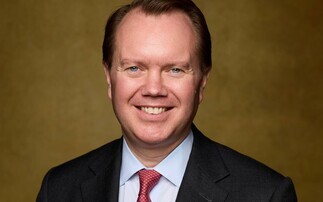Continuing his series on active and passive investing, Graham Bentley considers the possibility some fees charged for investment advice might constitute ‘money for nothing'
Over the last few months I have been batting on in this column about the loftily termed ‘Selectivist/Passivist' schism in asset management. We have considered what alpha is, how factors influence returns, active share as a measure of selectivity and the evidencing of skill versus luck. In this final article, I want to consider the economics of investment advice.
It can be argued that an equity market's returns (its ‘beta') are driven by forecast cashflows, and the discount rate - in other words, getting the net present value of those flows. For close to 35 years, global investment returns have been driven by the discount rate, as positively impacted by falling interest rates and inflation.
Daily rolling 10-year returns on the FTSE All-Share index have fallen inexorably for more than 30 years. While, the decade to 1985 had produced 33% per annum returns, by 1995 the rolling 10-year annualised return had more than halved to 15%. By 2005 it had almost halved again to 8% and today it is approaching 4.5%. Evidence suggests this is the level we should get used to - yet it is still a premium relative to the risk-free rate, and inflation.
Investors' required investment outcomes are delivered via what could be described as a ‘minimum acceptable return' (MAR) - a figure that is composed of a number of elements. The first is the total investment return required to fund an objective - for example, a target capital value, or sustainable withdrawals.
The second is inflation, in order to preserve the net present value of the objective. The third is the total cost of ownership (TCO) - that is to say, the sum of ancillary costs associated with administering the investment, including fund and portfolio fees, platform fees, adviser fees and so on.
Let's say these are 10 basis points (bps) for passive funds, 35bps for a platform, and 75 bps for advice. That's 1.2%, or around 25% of the expected return. Assuming a conservative 1% for inflation, then our investor needs to be satisfied by a real return, net of fees, of less than 2.5% per annum.
Now, this assumes a 100% equity portfolio. A 50/50 bond equity portfolio -unfortunately more prevalent for retirees - is likely to return 200bps less, with ancillary costs destroying the majority of returns. Unless the investor can live happily with an income of around 0.5%, then something has to change.
Passivist advisers face a potentially difficult conversation here since, by definition, they cannot deliver market returns, while their adviser fees are up to 10x higher than those of the associated funds. Unless market returns increase significantly, and where ancillary advisory costs prevail, investors' MARs will require an Alpha contribution in order to satisfy even the most conservative of requirements.
A selectivist approach is the only way to achieve this excess-return requirement. I believe this to be so self-evident that I question the rationale of an adherence to an exclusively passivist approach.
Highly variable outcomes
While there is a case for passivism in crowded, relatively efficient markets, I do not believe this is the exclusive driver of their use by passivist financial planners. While financial planning relies on rules, investment does not. Outcomes are highly variable, and thus more likely to be sub-optimal. Investment advice carries significantly greater business risk, with little revenue premium.
I suspect financial planners purporting to offer an exclusively passive investment solution are less likely to possess an investment qualification. Advisers who lack confidence in their investment knowledge and have limited experience of business cycles will find the passive argument attractive because it is the less risky option for their business, and bears the sheen of academia.
Passivity provides further support by avoiding exposure to ‘selection failure'. It allows its promoters to fail conventionally, along with the herd, as the adviser pleads blamelessness in times of market turmoil. In these circumstances investment advice becomes the premium service.
Asset allocation is provided by an external source or for free via a platform, where auto-rebalancing is also facilitated by the platform. No research is required, nor monitoring since selectivity is, by definition, avoided. Reporting is done by the platform, and valuations are readily available. The process is far from burdensome.
Meanwhile, passivist advisers' adherence to ad valorem fees stubbornly remains - at a heady 100bps in many cases - despite the absence of the associated research and monitoring that selectivity requires. An ad valorem fee, in these circumstances, with little risk to the adviser, makes one wonder whether the chicks are free too.
Graham Bentley is managing director of investment consultancy gbi2










